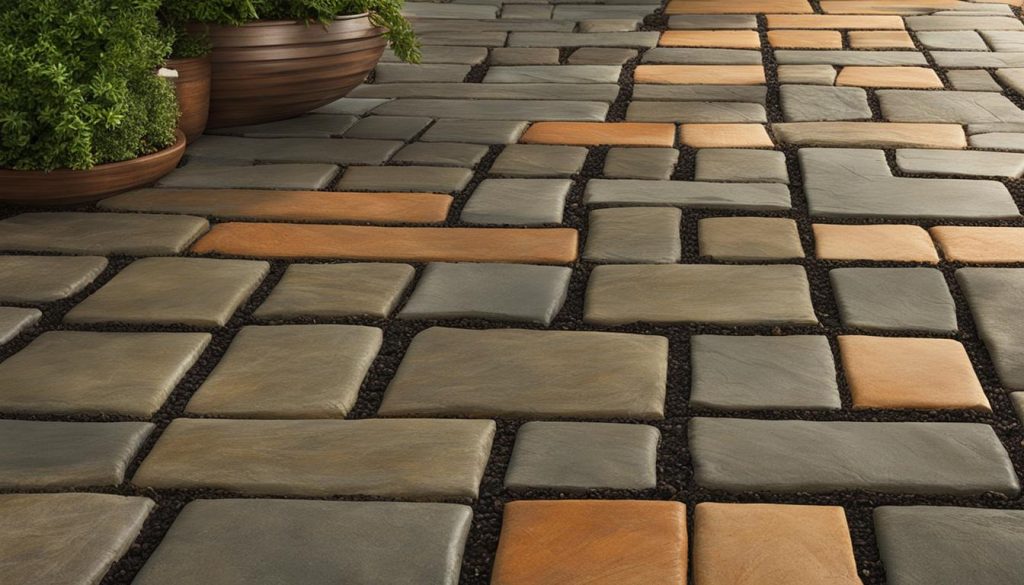Welcome to our comprehensive guide on choosing the perfect material for your landscaping project. In this article, we will explore the differences between interlocking and flagstone options, to help you make an informed decision that best suits your needs. We understand that landscaping can be overwhelming, especially with the wide range of materials available. That’s why we are here to guide you through the process and provide you with all the necessary information to make the best decision for you.
Key Takeaways:
- Interlocking and flagstone are two popular options for landscaping projects
- Interlocking provides a range of design options and ease of installation
- Flagstone offers a unique and rustic appearance, with excellent durability and heat retention
- Factors such as aesthetic preferences, budget, maintenance requirements, and intended use should be considered when choosing between the two materials
- Both materials have benefits and drawbacks, so it’s essential to make an informed decision that aligns with your needs and vision
What is Interlocking?
When it comes to landscaping projects, interlocking is a popular method of laying paving stones. Interlocking refers to fitting the pavers together tightly, creating a stable and durable surface for walkways, patios, and driveways. The interlocking pavers are designed to be both functional and visually pleasing.
Interlocking pavers are available in a variety of colors and shapes, allowing for endless design possibilities that can complement any landscape. Additionally, the ease of installation makes it a popular choice for DIY enthusiasts.
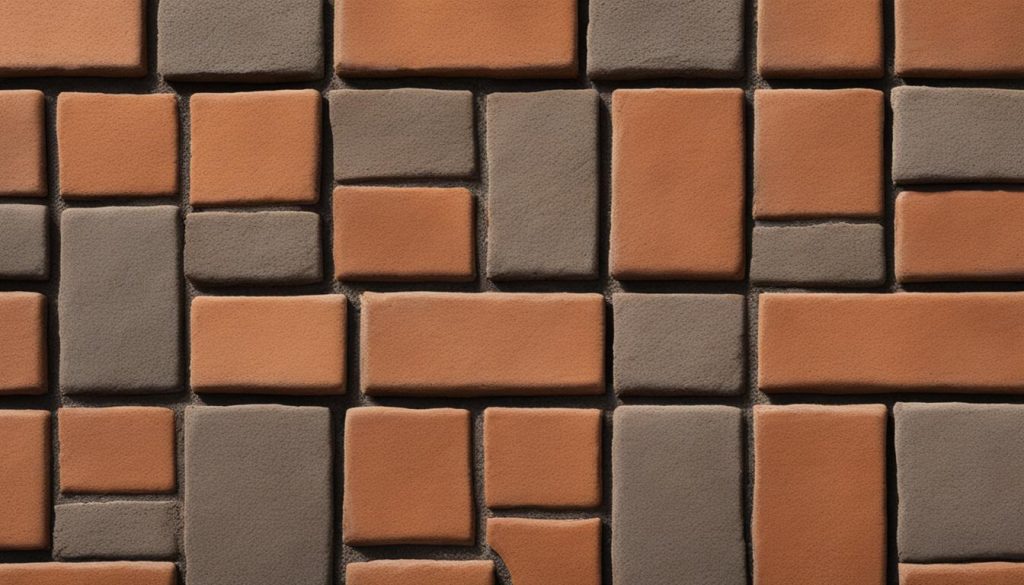
Overall, interlocking is a versatile and reliable option for any landscaping project. Its durability, functionality, and design options make it an excellent choice for both residential and commercial properties.
Advantages of Interlocking Pavers
Interlocking pavers offer numerous benefits for your landscaping projects. For one, they are highly durable and can withstand heavy foot traffic, making them an excellent choice for driveways, walkways, and patios. Additionally, they are resistant to extreme weather conditions such as freezing and thawing, which is important for Canadian climates. This means that interlocking pavers will not crack or shift under these conditions, ensuring that your outdoor space remains safe and stable.
Another advantage of interlocking pavers is their low maintenance requirements. They do not require regular sealing or painting, which can be time-consuming and costly. Instead, they only need occasional cleaning and re-sanding to maintain their appearance. This not only saves you time but also reduces your overall maintenance costs.
Interlocking pavers also offer a range of design options to suit your aesthetic preferences. They come in a variety of colors, shapes, and textures, allowing for creative combinations that can complement your home’s architecture and style. Whether you prefer a classic look or a modern design, interlocking pavers can provide the versatility and flexibility needed to achieve your desired look.
Overall, interlocking pavers are a great choice for landscaping projects due to their durability, low maintenance requirements, and design options. With proper installation and maintenance, they can add value and beauty to your outdoor space for years to come.
What is Flagstone?
Flagstone is a popular natural stone material used in outdoor landscaping projects. It features a flat and irregular shape, giving a unique and rustic appearance to any landscape. Flagstone is mined from quarries and comes in a variety of colors and sizes, making it a versatile material for designing patios, walkways, and retaining walls.
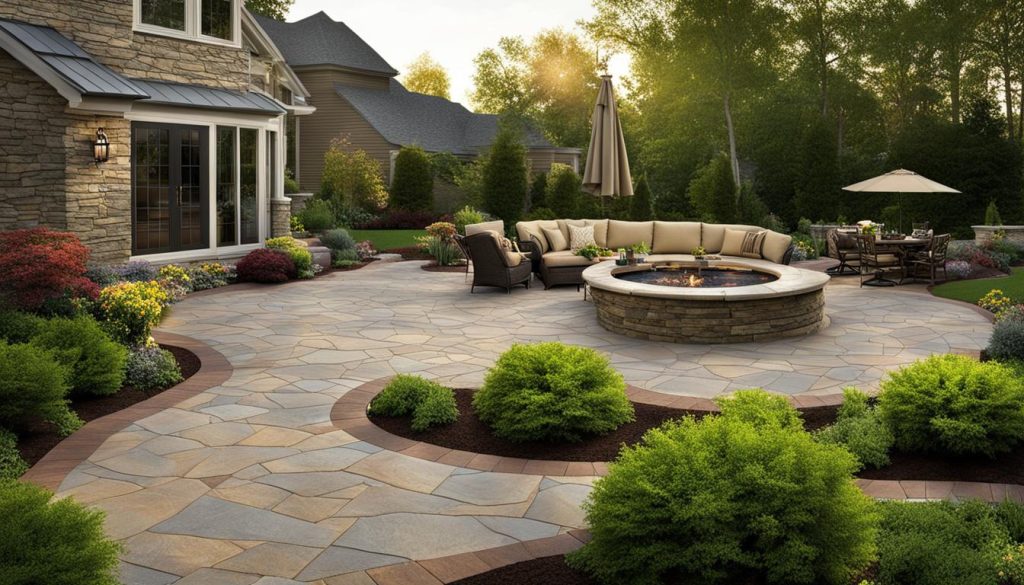
Flagstone’s durability and ability to withstand heavy foot traffic make it a popular choice for high-traffic areas. With its natural beauty and wide range of colors, flagstone can add character and depth to any outdoor space. Additionally, flagstone has a natural ability to retain heat, making it an excellent choice for cooler seasons.
Advantages of Flagstone: A Natural Beauty for Your Landscape
Flagstone is a popular choice for homeowners seeking a natural and timeless material for their outdoor projects. Here are some of the advantages of using flagstone for your landscaping needs:
- Durability: Flagstone is highly resistant to wear, making it an ideal material for high-traffic areas such as patios and walkways.
- Natural Beauty: Flagstone’s unique color variations and irregular shapes add a rustic charm to any landscape.
- Design Options: Flagstone comes in a variety of colors, textures, and sizes, allowing for endless design possibilities.
- Retains Heat: Flagstone has the ability to retain heat, making it a perfect material for outdoor fireplaces and fire pits.
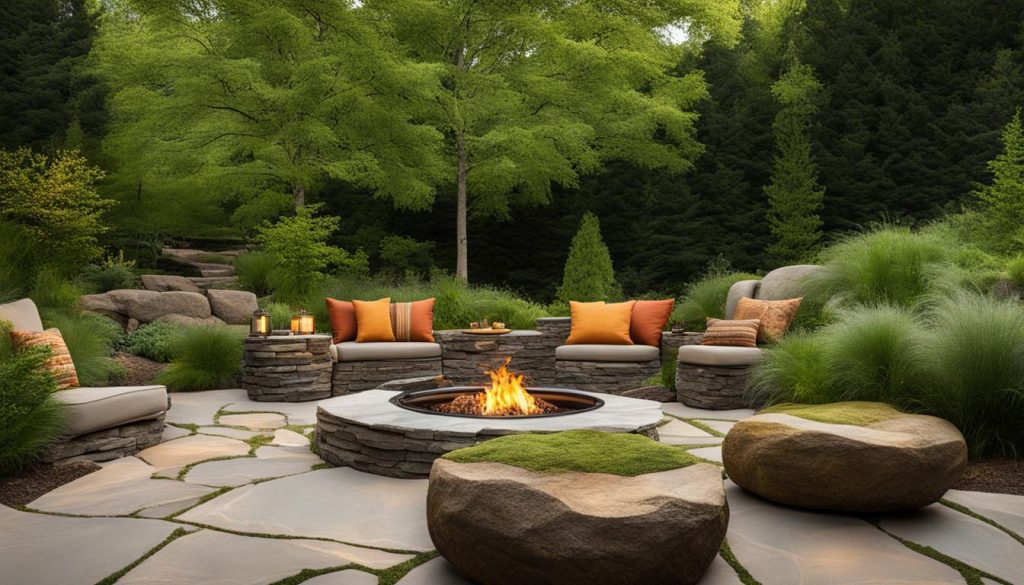
Additionally, flagstone is a natural stone material, which means that it is environmentally friendly and sustainable. Its longevity can also lead to cost savings in the long run, as it does not require frequent repairs or replacements.
If you’re looking for a durable, visually appealing, and eco-friendly material for your landscape project, consider using flagstone. Its unique beauty and versatility make it a great choice for any outdoor space.
Factors to Consider when Choosing between Interlocking and Flagstone
Choosing between interlocking and flagstone can be a tough decision, but evaluating some key factors can make the choice easier.
Aesthetic Considerations
Consider the aesthetic appeal of each material and how it will complement your outdoor space. Interlocking pavers offer a range of colors, textures, and patterns, allowing for versatile design options. Flagstone, on the other hand, has a natural and rustic appearance, with its unique and irregular shapes and earthy tones.
Budget Considerations
Determine your budget and consider the cost of each material. Interlocking pavers are generally affordable and come with a wide range of price points. Flagstone, being a natural stone material, is typically more expensive.
Intended Use
Consider the intended use of the area you want to pave. Both materials have their advantages depending on the purpose of the space. For high-traffic areas such as driveways, interlocking pavers are a great choice, while flagstone is a better option for pathways or patios where people will walk barefoot.
Maintenance Requirements
Maintenance requirements play an important role in choosing between interlocking and flagstone. Interlocking pavers are relatively low maintenance, requiring occasional cleaning and re-sanding. Flagstone, being a natural stone, may require occasional resealing and regular sweeping to maintain its appearance and prevent weed growth.
Installation Process
The installation process for interlocking and flagstone materials differs significantly. Interlocking pavers have a relatively simple installation process, while flagstone requires expert installation. The complexity and duration of the project will also affect the cost of installation.
Consider all of these factors and evaluate what works best for your landscaping project. Take into account both the aesthetic appeal and functional requirements of your project, your budget, and maintenance needs when deciding between interlocking and flagstone.
Design Options with Interlocking and Flagstone
One of the most exciting aspects of choosing between interlocking and flagstone materials is the range of design options available for your landscaping project. Interlocking pavers come in various shapes, colors, and patterns, offering endless possibilities for creating unique and visually appealing outdoor spaces.
You can choose from simple geometric designs, such as herringbone or basketweave patterns, or more intricate designs, like the circle kit or fan pattern. Adding borders or accents can further enhance the design of your interlocking surfaces, creating a cohesive and polished look.
Flagstone, on the other hand, provides a natural and organic look. Its irregular shapes and earthy tones create a rustic and charming feel for any outdoor space. You can choose from a wide range of colors, including slate blue, beige, gray, and brown, making it an adaptable material for a variety of design styles.
With flagstone, you can opt for a random pattern or create a more structured design by cutting the stones into uniform shapes. Additionally, you can pair flagstone with other materials, such as gravel or moss, to add texture and interest to the space.
As you consider your desired style and overall landscape design, we recommend exploring the different design options available for both interlocking and flagstone materials. This will help you choose the material that best aligns with your aesthetic preferences and functional requirements.
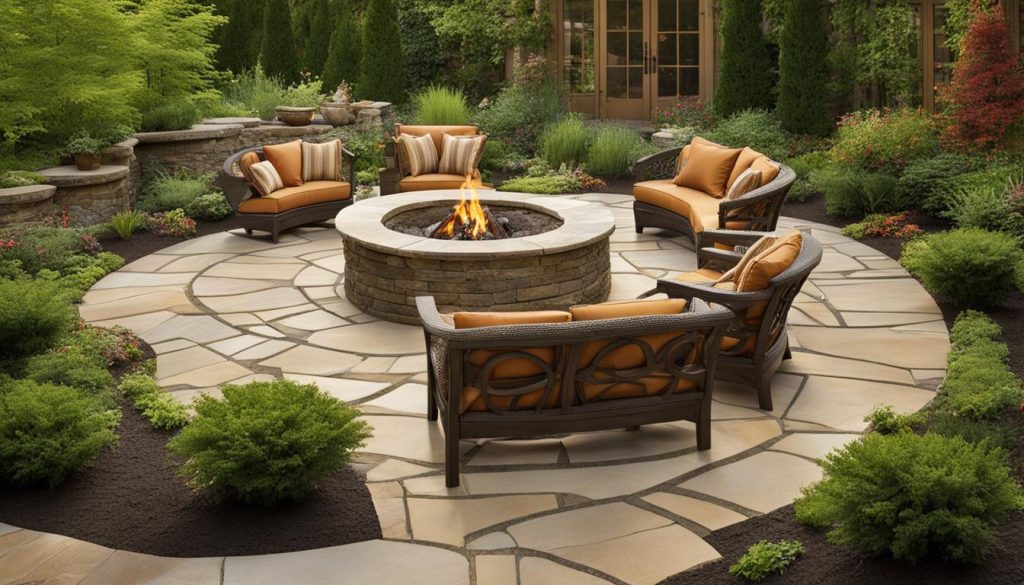
Installation Process and Costs
When it comes to the installation process and costs, interlocking and flagstone materials differ significantly. Interlocking pavers are relatively easy to install, with most projects only requiring a compacted base and sand or gravel bedding. The interlocking pieces then fit together with ease and precision, creating a stable surface that can be walked on within hours of installation.
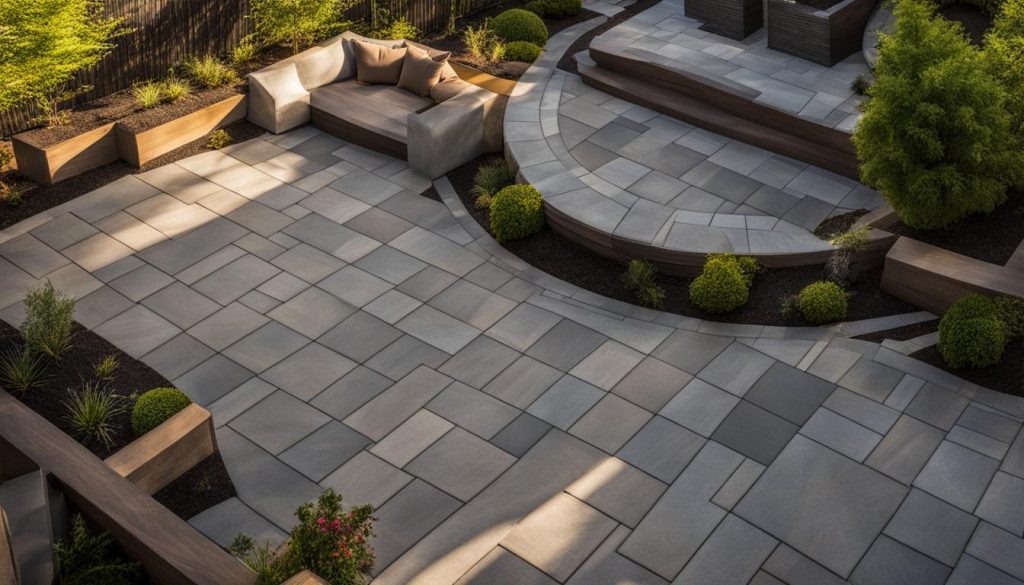
Interlocking pavers are a cost-effective option for those on a budget.
Flagstone installation, on the other hand, is a more labor-intensive process and typically requires more time to complete. The installation process can involve excavation, leveling the ground, and applying mortar to the surface before laying the flagstone pieces. Due to the complexity of the installation, it’s best to hire a professional for the job.
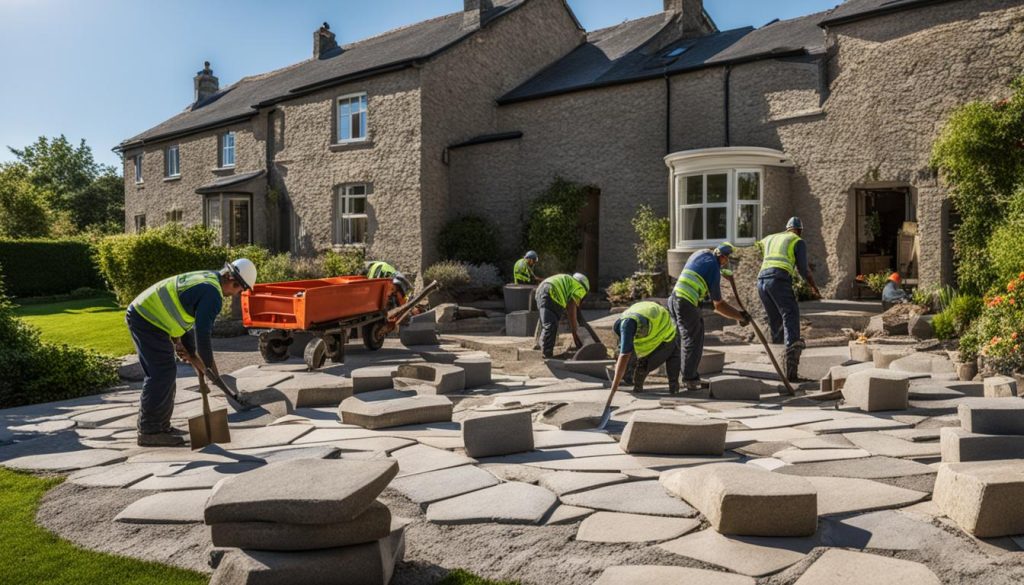
Flagstone installation can be more costly due to the need for professional help and labor-intensive installation processes.
The cost of materials and labor will vary depending on the chosen material and the complexity of the project. Interlocking pavers are generally more cost-effective than flagstone, making them a popular choice for those on a budget. However, if you’re looking for a unique and rustic aesthetic, flagstone may be worth the extra cost.
It’s important to factor in the cost of installation when deciding between interlocking and flagstone materials.
Maintenance Requirements for Interlocking and Flagstone: Keeping Your Outdoor Spaces Looking Beautiful
Ensuring the longevity and aesthetics of your outdoor spaces requires proper maintenance of your interlocking or flagstone materials. Here, we outline the maintenance requirements for each material:
Interlocking Maintenance Requirements
Regular Cleaning: Interlocking pavers require occasional cleaning to remove dirt, debris, and stains. Use a pressure washer or a stiff-bristled brush and water to clean the pavers, and avoid using harsh chemicals that can damage the stone.
Re-sanding: Sand used as a bedding material between interlocking pavers can erode over time, resulting in loose or uneven stones. Re-sanding the pavers every few years can help maintain the stability of the surface.
Sealing: While not strictly necessary, sealing your interlocking pavers can help protect them from stains and fading caused by UV rays.
Flagstone Maintenance Requirements
Regular Cleaning: Flagstone requires frequent cleaning to prevent dirt and debris buildup that can lead to discoloration and staining. Use a pressure washer or a soft-bristled brush and water to clean the surface.
Resealing: Flagstone should be sealed every few years to protect the stone from wear and tear caused by foot traffic, weather, and other factors. Sealers help preserve the natural beauty of the stone and prevent it from fading or cracking over time.
Regular Maintenance: Regular sweeping and clearing of debris are essential to maintaining the appearance and stability of flagstone surfaces. Avoid using sharp tools that can scratch or damage the stone, and promptly address any cracks or chips to prevent further damage.
With proper maintenance, both interlocking and flagstone materials can provide a durable and visually appealing surface for your outdoor spaces.
Making Your Decision
Choosing between interlocking and flagstone for your landscaping project can be an overwhelming decision. However, by evaluating the factors, advantages, and design options, you can make an informed choice that aligns with your vision and requirements.
Consider your desired aesthetic, budget, maintenance requirements, and the intended use of the area. Are you looking for a natural or a modern look? Do you need a highly durable surface for heavy traffic or a low-maintenance option?
Interlocking pavers offer a range of design options and are known for their durability, resistance to extreme weather conditions, and low maintenance requirements. Flagstone, on the other hand, provides a natural and rustic appearance, is highly durable and can retain heat.
The installation process and costs differ for both materials. Interlocking pavers are relatively easy to install, while flagstone requires more labor-intensive processes. The costs for materials and labor will vary depending on the chosen material and the complexity of the project.
Key Considerations:
Here are some key considerations to help you make your decision:
- Aesthetic: Interlocking provides a modern look while flagstone offers a rustic appearance.
- Durability: Both materials are highly durable and can withstand heavy traffic.
- Maintenance: Interlocking requires occasional cleaning and re-sanding, while flagstone may require occasional resealing.
- Installation: Interlocking is relatively easy to install, while flagstone requires more labor-intensive processes.
- Costs: The costs for both materials will vary depending on the chosen material and the complexity of the project.
By evaluating these key considerations, you can make the right decision for your landscaping project. Remember, both interlocking and flagstone offer unique benefits, so choose the material that best aligns with your needs and preferences. If you have any questions, don’t hesitate to ask. We’re always here to guide you. Our team provides interlocking design and construction services for all types of interlocking projects – backyard, driveway, patio, porch, walkway, and pool. Contact us at (647) 812-9317!

